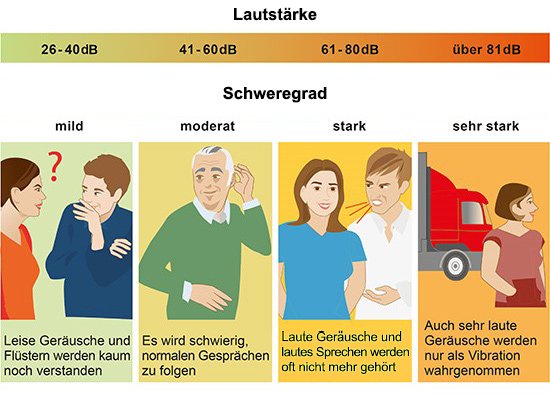Barker F, Mackenzie E, Elliott L et al. Interventions to improve hearing aid use in adult auditory rehabilitation. Cochrane Database Syst Rev 2016; (8): CD010342.
Brandes R, Lang F, Schmidt R. Physiologie des Menschen: mit Pathophysiologie. Berlin: Springer; 2019.
Dawes P, Maslin M, Munro KJ. 'Getting used to' hearing aids from the perspective of adult hearing-aid users. Int J Audiol 2014; 53(12): 861-870.
Deutsche Gesellschaft für Hals-Nasen-Ohren-Heilkunde, Kopf- und Hals-Chirurgie (DGNO-KHC). Implantierbare Hörgeräte (S2k-Leitlinie, in Überarbeitung). AWMF-Registernr.: 017-073. 2017.
Ferguson MA, Kitterick PT, Chong LY et al. Hearing aids for mild to moderate hearing loss in adults. Cochrane Database Syst Rev 2017; (9): CD012023.
Funk A, Garcia C, Mullen T. CE: Original Research: Understanding the Hospital Experience of Older Adults with Hearing Impairment. Am J Nurs 2018; 118(6): 28-35.
Gallagher NE, Woodside JV. Factors Affecting Hearing Aid Adoption and Use: A Qualitative Study. J Am Acad Audiol 2018; 29(4): 300-312.
Haanes GG, Hall EO, Eilertsen G. Acceptance and adjustment: A qualitative study of experiences of hearing and vision impairments and daily life among oldest old recipients of home care. Int J Older People Nurs 2019; 14(3): e12236.
Heacock RM, Montano JJ, Preminger JE. Adult Children's Perspectives on Their Role in Their Parent's Hearing Healthcare Processes. J Am Acad Audiol 2019; 30(10): 871-882.
Health Quality Ontario. Bilateral Cochlear Implantation: A Health Technology Assessment. Ont Health Technol Assess Ser 2018; 18(6): 1-139.
Heffernan E, Coulson NS, Henshaw H et al. Understanding the psychosocial experiences of adults with mild-moderate hearing loss: An application of Leventhal's self-regulatory model. Int J Audiol 2016; 55 (Suppl 3): S3-S12.
Hughes SE, Hutchings HA, Rapport FL et al. Social Connectedness and Perceived Listening Effort in Adult Cochlear Implant Users: A Grounded Theory to Establish Content Validity for a New Patient-Reported Outcome Measure. Ear Hear 2018; 39(5): 922-934.
Kraaijenga VJ, Ramakers GG, Grolman W. The Effect of Earplugs in Preventing Hearing Loss From Recreational Noise Exposure: A Systematic Review. JAMA Otolaryngol Head Neck Surg 2016; 142(4): 389-394.
Lawrence BJ, Jayakody DM, Henshaw H et al. Auditory and Cognitive Training for Cognition in Adults With Hearing Loss: A Systematic Review and Meta-Analysis. Trends Hear 2018; 22: 2331216518792096.
Lenarz T, Boenninghaus HG. Hals-Nasen-Ohren-Heilkunde. Berlin: Springer; 2012.
Löhler J, Cebulla M, Shehata-Dieler W et al. Hearing Impairment in Old Age. Dtsch Arztebl Int 2019; 116(17): 301-310.
Löhler J, Walther LE, Hansen F et al. The prevalence of hearing loss and use of hearing aids among adults in Germany: a systematic review. Eur Arch Otorhinolaryngol 2019; 276(4): 945-956.
Loughrey DG, Kelly ME, Kelley GA et al. Association of Age-Related Hearing Loss With Cognitive Function, Cognitive Impairment, and Dementia: A Systematic Review and Meta-analysis. JAMA Otolaryngol Head Neck Surg 2018; 144(2): 115-126.
Manchaiah VK, Stephens D, Meredith R. The patient journey of adults with hearing impairment: the patients' views. Clin Otolaryngol 2011; 36(3): 227-234.
Pschyrembel online. 2024.
Śliwińska-Kowalska M, Zaborowski K. WHO Environmental Noise Guidelines for the European Region: A Systematic Review on Environmental Noise and Permanent Hearing Loss and Tinnitus. Int J Environ Res Public Health 2017; 14(10): 27.
Taljaard DS, Olaithe M, Brennan-Jones CG et al. The relationship between hearing impairment and cognitive function: a meta-analysis in adults. Clin Otolaryngol 2016; 41(6): 718-729.
Tikka C, Verbeek JH, Kateman E et al. Interventions to prevent occupational noise-induced hearing loss. Cochrane Database Syst Rev 2017; (7): CD006396.
World Health Organization (WHO). Fact Sheet: Deafness and hearing loss. 2024.
World Health Organization (WHO). Grades of hearing impairment. 2024.
Yuan J, Sun Y, Sang S et al. The risk of cognitive impairment associated with hearing function in older adults: a pooled analysis of data from eleven studies. Sci Rep 2018; 8(1): 2137.
IQWiG-Gesundheitsinformationen sollen helfen, Vor- und Nachteile wichtiger Behandlungsmöglichkeiten und Angebote der Gesundheitsversorgung zu verstehen.
Ob eine der von uns beschriebenen Möglichkeiten im Einzelfall tatsächlich sinnvoll ist, kann im Gespräch mit einer Ärztin oder einem Arzt geklärt werden. Gesundheitsinformation.de kann das Gespräch mit Fachleuten unterstützen, aber nicht ersetzen. Wir bieten keine individuelle Beratung.
Unsere Informationen beruhen auf den Ergebnissen hochwertiger Studien. Sie sind von einem Team aus Medizin, Wissenschaft und Redaktion erstellt und von Expertinnen und Experten außerhalb des IQWiG begutachtet. Wie wir unsere Texte erarbeiten und aktuell halten, beschreiben wir ausführlich in unseren Methoden.


